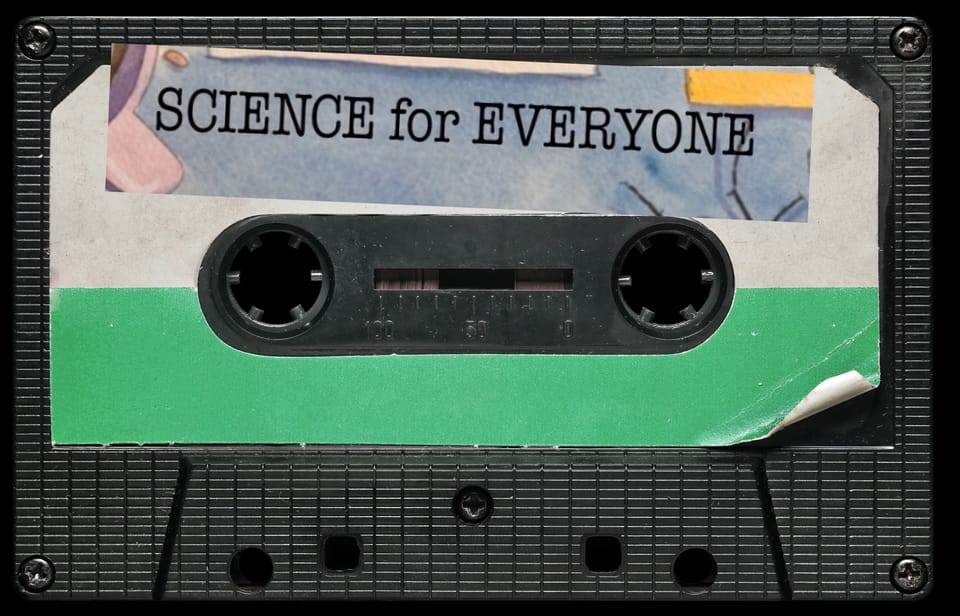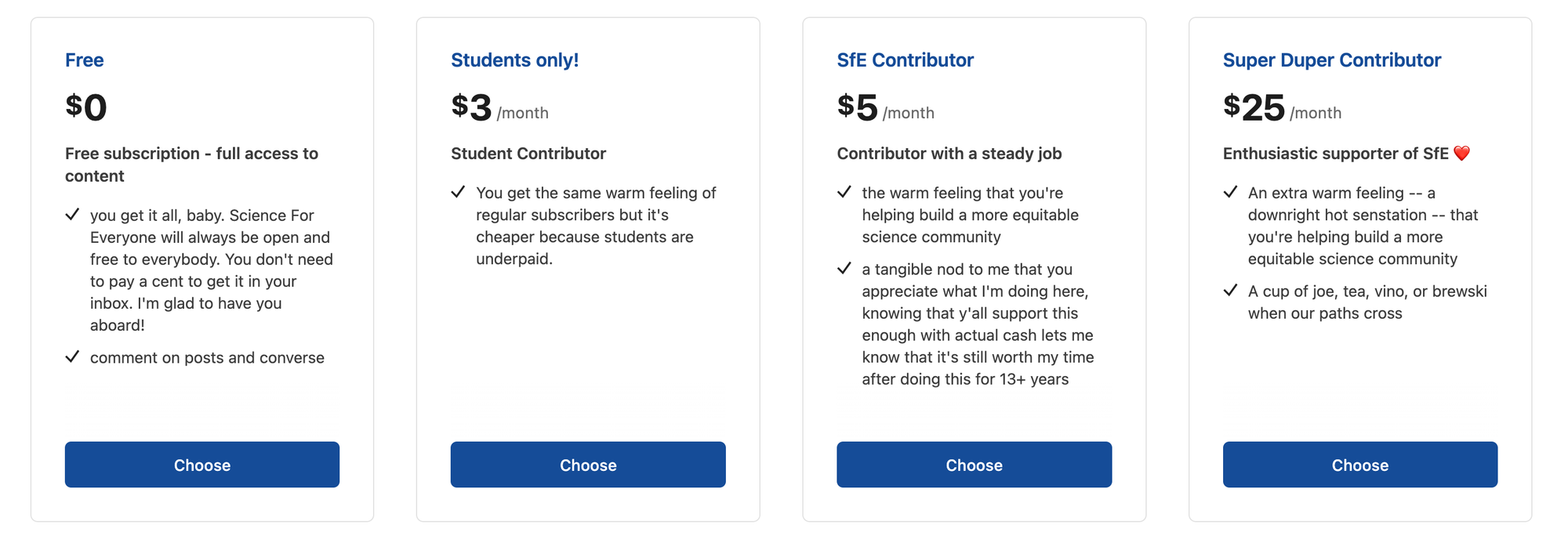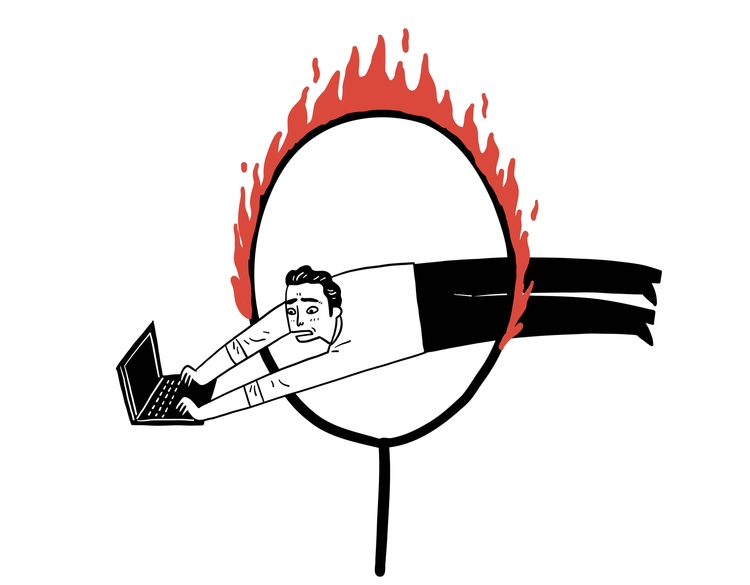Academic Mixtape 35

"I didn't think I needed mentorship training—but it reshaped my approach"
This is cool: Faculty First Responders is a group that monitors attacks on academics from right-wing reactionaries and mobilizes to support them with peer-to-peer counseling. This book review of a biography of Peter Matthiessen is pretty interesting, I thought.
Ecologists: You've still got a couple weeks to submit nominations for awards from the Ecological Society of America. Note that there's a new one they're launching: the Mentorship Award for Enhancing Diversity, Inclusion, and Belonging in Ecology, called the Bazzaz and Pickett award. Let's see some great folks put up for this one! Two awards per year.
The US Office of Government Accountability is still up to some good work. They recently published a report entitled, "Sexual Harassment: Actions Needed to Ensure Consistent Agency Policies for Research Institutions" There are two key recommendations in this report. First, they encourage the Office of Science Technology and Policy to make sure that federal agencies are continuing to develop and implement policies to reduce sexual harassment associated with research that they fund. Second, they recommend changing guidelines so that federal agencies can better share information about investigations. I can't imagine this happening under the current overlords, but it's encouraging to see some corners of government steadily working along to be as impactful as possible.
Martín Nuñez just published A Pocket Guide to Scientific Writing and Publishing, which is a great primer for folks new to the game. I was chatting with a grad student about publishing her first paper, and then I gave them this book which said everything I did but better, and then plenty more. It also is from the perspective of someone who is first-gen and with a first language other than English. Great stuff for early career researchers who are just starting out who don't necessarily feel like they fit in. Which was most of us, right?
Folks may argue whether or not we should call our new geological time period the Anthropocene or the Homogocene. I think the latter feels rather apt if you're picturing future paleontologists digging up fossils and learning about how life changed on earth. Thinking of this as mosquitos just arrived in Iceland. As far as I know, there still are no ants there, though.
A news story in Nature about the reduction in slots in doctoral programs in the US.
A good article in The New Yorker about what's happening inside the current White House designed to dismantle higher ed in the US.
Inside the brain drain in NASA. This one hit me close to home. Actually, in my home.
I don't know if you caught the whole thing weeks ago where Ta-Nehisi Coates appeared on Ezra Klein's podcast. In the kindest and clearest manner possible, Coates laid bare the copious errors of the middle-of-the-road Democratic consultant class that has led us into ruin, while addressing how Klein took misstep after misstep in the aftermath of the murder of Charlie Kirk. So, SO much has been written about it. Here's one of those things.
When I'm working with students who are new to science and I'm trying to explain all the bizarre things about cultural norms, career advancement, authorship, job searching, grad school applications, and the whole shebang, there's one chestnut I keep coming back to. "Nothing in academia makes sense except in light of prestige." Think about it. All of the bad and bizarre stuff that happens, all of the harmful incentives and exploitation, it just doesn't make sense unless you see it through the lens of how prestige works. So when I saw this career piece from a scientist who moved abroad, it brightened up my day a little bit: "I thought science hinged on prestige. Moving abroad made me reassess my priorities"
A faculty committee at Harvard University called the "Classroom Social Compact Committee" issued a substantial report on problems that exist in their classrooms and what they recommend for fixing them. It's really interesting. I've seen a few people highlight one or two remarks or findings and use them to paint broad strokes in a single color. (For example, on grade inflation, or on how students feel they can or can't express themselves in the classroom.) But things aren't that simple. Anyhow I can't possibly have the time to read all of this or think about and write about all of it. But my heavy browse made me think I had to share this with you.
Bethany Brookshire is wholly relatable as she frets over our problem that every social media outlet is horrible.
Well, not every outlet. I think the verdict is out on bluesky, which still has good elements (even though they've made some wrongheaded decisions in the last couple months). Here's a conversation about how AI has ruined the back end of Wiley's editorial management system, for example.
Sometimes we resist AI for good reasons. (This is not paywalled. There's a wall, but it's a registration wall. No pay involved. And I think it's worth the effort.)
Apparently a thing happened at Rocky Mountain Biological Lab, in which 13 members of the community requested that the (outdated and problematic) book The Population Bomb be removed from the Visitor Center of the lab. This was there in the first place only because the author is a well-established member of that community and they presumably were promoting his book because it has been highly influential (though not necessarily in a healthy way). I only heard about this from a newsletter post from Ian Billick, the former director of RMBL (to be clear, who I know and appreciate), who interpreted this event as an overswing of a pendulum for social change. He thought that the interest in pulling The Population Bomb was a matter of cancel culture and not a good thing. I don't know Paul Ehrlich and haven't worked with him, but I am familiar with The Population Bomb, so I can evaluate the book without being worried about how it might affect my relationship with the man or any institutional impact. I read it in college, and it influenced my thinking back in the day. The more I've grown and learned about environmental impacts of human activity, I've seen that the arguments in The Population Bomb are not only factually incorrect, but they are harmful and have been leveraged to foster policies that harmed economic development in the Global South. Were there good intentions? Sure. Does that matter? I suppose it does when you're judging the person but obviously impact > intent. There is a flavor of man in ecology and evolutionary biology who stretch so far enough outside their lane and get it so wrong that they do harm. In 1968, Paul Ehrlich argued for sterilization campaigns in the interest of preventing famine. In 1978, EO Wilson literally argued for eugenics to improve human evolution. In 1997, Jared Diamond got anthropology spectacularly wrong in a post-hoc rationalization of European imperialism. In 2019, ecologist Thomas Crowther dabbled into international development and carbon markets and launched an ill-advised worldwide effort to plant trees in places where they don't belong, triggering the misallocation of hundreds of millions of dollars. I'm not saying that these men should have simply stayed in their narrow scientific lanes, but what they should have done is collaborated with people who are experts in those disciplines. Imagine what would have happened if Ed Wilson collaborated with experts in human evolution before writing a book about human evolution? Imagine if Jared Diamond chose to work with cultural anthropologists, or if Paul Ehrlich worked on the population bomb with experts in international development and food systems? I think RMBL ultimately got it right, by putting The Population Bomb by putting it in the history section, and the only reason it's there is because the author is a member of that community.
Phew.
Have a great trick-or-treating and/or baseball watching or whatever you're doing this fine weekend.
By the way, I realize that I haven't pushed paid subscriptions at all since I moved over to this new platform. Substack was very heavy handed about that, which is also another reason I moved on. But here, since I have removed all paywalls, I've not said a thing about it. So I thought I'd mention. If you appreciate the work I put in here, feel free to subscribe using the handy dandy button. As low as three bucks per month! Once I cover the costs of this site, I use the funds to support junior scientists in need. For example, I just allocated some to student conference travel awards (managed by the International Union for the Study of Social Insects).
For a bunch of reasons, the past couple months have been a slog. What's kept me going here is knowing that I'm being compensated for this work - I can't give up on folks who are pitching in! Just like public radio, most listeners/readers are not paying for their subscription, but some folks need to if we're going to keep going. Why not you?
Here are the tiers:

Ciao for now.



Member discussion